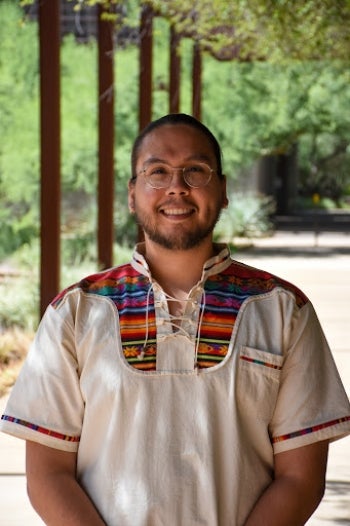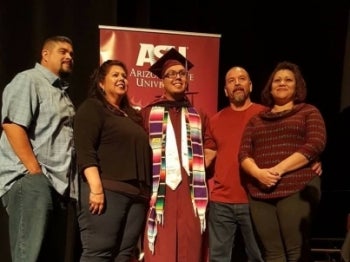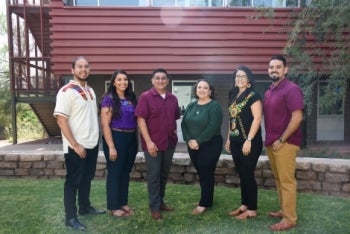Chicano alumnus reflects on the impact of education, heritage

ASU alum Martine Garcia Jr. is the assistant director of strategic initiatives for ASU Career Services. Courtesy photo
As a child, Martine Garcia Jr. remembers sitting in the back of the Oaxaca Restaurant in Phoenix where his mother worked. He would often see U.S. Rep. Ed Pastor come in for a meal and hear his mom speak with pride about Arizona’s first Hispanic member of Congress.
Garcia could not imagine that one day Pastor would sit in the audience at Arizona State University's Hispanic Convocation and listen to him speak as the recipient of the 2017 Ed Pastor Outstanding Graduate Student Award.
“It was amazing,” he said. “I got to speak on our Chicano culture. I got to speak on our heritage. I got to tell stories about my parents, about the things … essential to my success.”
Garcia graduated that day with two master’s degrees, in management and legal studies. Just one year earlier he had earned a bachelor’s degree summa cum laude from The College of Liberal Arts and Sciences.
Graduating three times with distinction is something that Garcia never could have envisioned for himself.
“It’s a feeling that can never be matched,” he said. “It’s pride. It’s not just pride in yourself, but pride in your family. It’s happiness. It’s a celebration. It’s also sadness that one chapter of your life is closing. It’s a myriad of emotions.”
Garcia had no family history of higher education. He was the first in his family to graduate from high school. Yet, his parents always emphasized the importance of higher education.
Growing up, he didn’t always take their advice to heart. He was an average student in high school, and he never aimed to earn a college degree.
But after working an unfulfilling summer job after his senior year of high school, he reached a turning point. Garcia enrolled at Chandler Gilbert Community College (CGCC), where he discovered ASU’s transfer pathway program.
At ASU, Garcia found his calling in higher education and passion for giving back to his community.
Today, Garcia works as the assistant director of strategic initiatives for ASU Career Services, helping students from both similar and different backgrounds to his own by organizing clubs, coalitions and career-readiness modules for underrepresented groups on campus and in the community.
As the university celebrates this year’s Hispanic Heritage Month, Garcia reflects on his journey up to this point, and the impact education and his Chicano identity have had on his life.
Embracing heritage
Ever since Garcia was young enough to understand, he remembers his grandparents saying to him, “You are a Chicano.”
For his grandparents, it was an important term of empowerment, advocacy and social awareness, representative of the Chicano Civil Rights Movement of the 20th century. It’s a title that Garcia still strongly identifies with, he said.
“We celebrate our heritage every day in every circle,” Garcia said, not just during one month.
Hispanic Heritage Month is an annual celebration from Sept. 15 to Oct. 15 that pays tribute to the enduring contributions and significance of Hispanic individuals in the United States.
The monthlong celebration acknowledges the diverse heritages and cultures of individuals with ancestral roots in Mexico, the Caribbean, Spain and Central and South America.
While Hispanic Americans celebrate their heritage year-round, this month provides an opportunity to celebrate with the wider community and explore the diversity of Hispanic identities, history and heritage.
“I really love this month because more than ever, everyone else is celebrating the culture. It’s not just my culture. Now we can all have fun together and we can learn and talk,” Garcia said.
Giving back
When Garcia began attending CGCC after graduating high school, his goal was to become an actor.
He met with his first career advisor and said, “I’m just here so I can get to Hollywood, dude. Show me how to do it.”
Instead, the career advisor asked Garcia what his interests were.
“From what I’m hearing,” Garcia recounted the advisor telling him, “you want to inspire people. You love to talk to people and share your story. You like to bring out the best in yourself and in others.”
The career advisor encouraged him to explore communications as a course of study, get involved on campus and find an on-campus job.
Garcia said the gesture of support was unfamiliar to him and felt like a handout.
“It’s not a handout. It’s a hand up,” he said the advisor told him. “And it’s not for free. You need to help somebody with this information when you get a chance.”
Garcia took the lesson from his advisor to heart. Ever since, he has always incorporated a culture of service into the work he does.
“It's what helps our community grow,” he said.
Creating community
In community college, Garcia became the founding president of the Male Empowerment Network (MEN) CGCC Chapter, a Maricopa County Community College District program focused on increasing the graduation and retention rates of minority men. To be in a room full of students like himself, who didn’t see themselves in education, building self-efficacy and self-advocacy was empowering, he said.
When he first got to ASU, he thought he had lost that community.
“I have a strong need for community. I need to be able to see myself in spaces that I’m in, and I need students to be able to do that,” Garcia said.
Once he transferred to ASU, he said the university rallied behind him and a few other transfer students who were members of MEN and helped them found a chapter at ASU. Once again, he was the founding president.
“I just think that’s a unique experience to ASU, that any person can come in and say, ‘Hey, this is the community I need,’ and folks rally around and say, ‘Let’s give you the resources you need,’” Garcia said.
In 2019, while working as a coordinator for ASU TRIO Student Support Services, Garcia encountered a similar situation on the Polytechnic campus.
“I would see a lot of Chicano students here and the Chicano staff and faculty, but I didn't really feel the community coming together. So we built our own community,” he said.
Garcia, along with four other staff members, created Poly Sol, a faculty and staff collective and branch of the Chicano/Latino Faculty and Staff Association at ASU, or CLFSA.
In spring 2021, CLFSA added a representative from Poly Sol to its executive board to strengthen commitment and outreach at the ASU Polytechnic campus and the East Valley. Garcia served as the first representative in the new role.
Now, Garcia is president-elect of CLFSA. He will serve in the upcoming year and continue fostering community and giving back.
Navigating the future
As students look to their futures and navigate the world, it can be daunting, but Garcia wants students to know that they are not alone.
“I think it's really hard when you're 18 years old and you're being asked to make a decision that feels like it's gonna be the rest of your life,” Garcia said. “I think some advice I'd give is knowing that nothing, especially in today's world, is as definite as we feel it is.”
Even Garcia said his journey has only just begun.
“Other students should see themself in me because I see myself in them. This is part of everyone's journey. We don't know what we're doing exactly all of the time. We have an idea. But as long as you move toward that idea, that's important,” he said.
To support ASU’s Hispanic students, staff and faculty, visit the ASU Foundation’s featured funds page and explore giving opportunities.
More Sun Devil community

Supporters show their generosity during Sun Devil Giving Day 2025
Thousands of Arizona State University supporters from across the globe came together on Sun Devil Giving Day on March 20 to give…

New ASU women's basketball coach has sights set on championships
Molly Miller apologized for being a few minutes late for her Zoom interview Sunday afternoon.No apology was necessary.It’s been a…
SolarSPELL wins 'best in show' award at South by Southwest
Arizona State University professors from a variety of disciplines made a big splash at the South by Southwest festival of…




